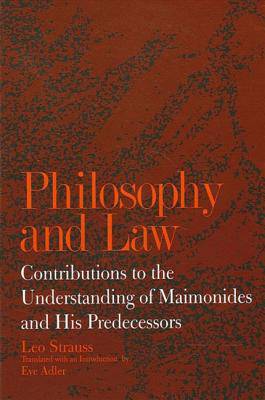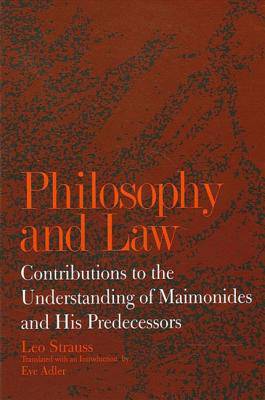
- Afhalen na 1 uur in een winkel met voorraad
- Gratis thuislevering in België vanaf € 30
- Ruim aanbod met 7 miljoen producten
- Afhalen na 1 uur in een winkel met voorraad
- Gratis thuislevering in België vanaf € 30
- Ruim aanbod met 7 miljoen producten
Zoeken
Philosophy and Law
Contributions to the Understanding of Maimonides and His Predecessors
Leo Strauss
€ 151,45
+ 302 punten
Uitvoering
Omschrijving
Leo Strauss's Philosophy and Law contains a groundbreaking study of the political philosophy of Maimonides and his Islamic predecessors, and it offers an argument on behalf of that philosophy which is also a profound critique of modern philosophy. Here is an entirely new and complete English translation of Strauss's work, which takes as its ideal the exacting standards of accuracy that Strauss himself emphasized in his own work. It includes a prefatory essay introducing the argument of each of the four sections of Philosophy and Law.
This is a fresh and challenging treatment of the perennial conflict between reason and revelation, or philosophy and religion. Strauss's key contention in this book is that the most influential modern approaches to this conflict have run aground in ways that reflect their loss of key insights developed by the medieval philosophers of Islam and their Jewish pupils, especially Maimonides. Strauss challenges the modern view that scientific enlightenment must ultimately amount to atheism, and that therefore there can be no such thing as enlightened religion. Through a careful, original, and detailed treatment of central works of the medieval Islamic-Jewish tradition, especially Maimonides' Guide of the Perplexed, Strauss aims to recover their key insights into this question.
This is a fresh and challenging treatment of the perennial conflict between reason and revelation, or philosophy and religion. Strauss's key contention in this book is that the most influential modern approaches to this conflict have run aground in ways that reflect their loss of key insights developed by the medieval philosophers of Islam and their Jewish pupils, especially Maimonides. Strauss challenges the modern view that scientific enlightenment must ultimately amount to atheism, and that therefore there can be no such thing as enlightened religion. Through a careful, original, and detailed treatment of central works of the medieval Islamic-Jewish tradition, especially Maimonides' Guide of the Perplexed, Strauss aims to recover their key insights into this question.
Specificaties
Betrokkenen
- Auteur(s):
- Uitgeverij:
Inhoud
- Aantal bladzijden:
- 164
- Taal:
- Engels
- Reeks:
Eigenschappen
- Productcode (EAN):
- 9780791419755
- Verschijningsdatum:
- 30/03/1995
- Uitvoering:
- Hardcover
- Formaat:
- Genaaid
- Afmetingen:
- 152 mm x 229 mm
- Gewicht:
- 226 g

Alleen bij Standaard Boekhandel
+ 302 punten op je klantenkaart van Standaard Boekhandel
Beoordelingen
We publiceren alleen reviews die voldoen aan de voorwaarden voor reviews. Bekijk onze voorwaarden voor reviews.











